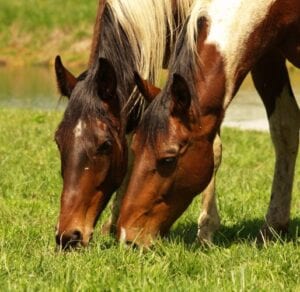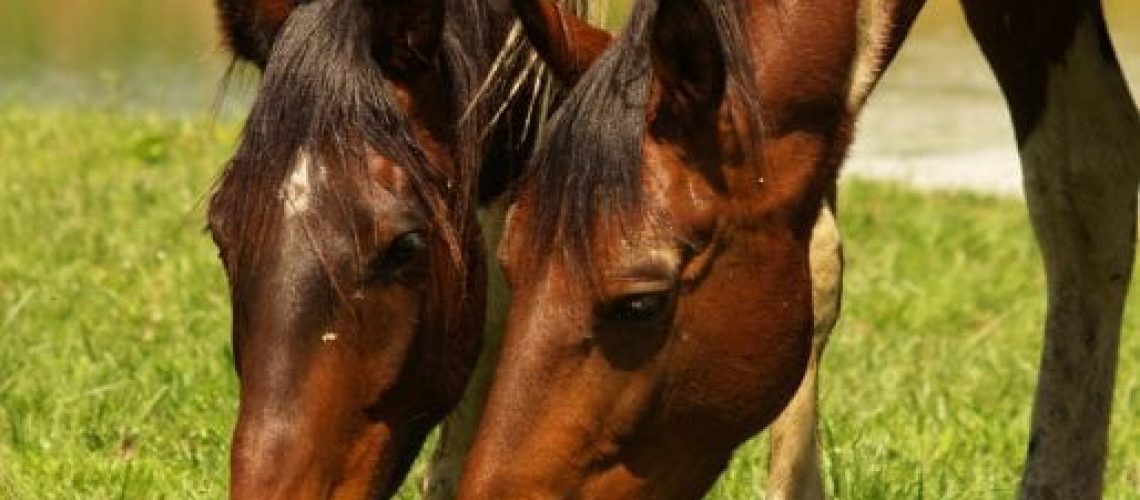By Hannah Mueller, DVM
Many barns still use basic rotational deworming with chemical products for parasite control. However, recent information and research is warning of parasite resistance to certain types of popular dewormers, and is calling for better management practices. Let’s take a look at how you can update your deworming program.
for parasite control. However, recent information and research is warning of parasite resistance to certain types of popular dewormers, and is calling for better management practices. Let’s take a look at how you can update your deworming program.
Why deworming is necessary
Untreated internal parasites in horses can lead to malnutrition, poor coat quality, abdominal distention, diarrhea, colic, and in some cases death. Each year during your horse’s annual examination, you should review your deworming program with your veterinarian to make sure it is up-to-date and right for your individual horse. You should also have a farm plan in place so all the horses on the property are also following their individual plans.
Just as the overuse of antibiotics has led to antibiotic resistance, the overuse of dewormers has led to “parasite resistance” — parasites that are no longer killed by a specific type of dewormer. When the problem first started, we combated it with rotational deworming programs. Unfortunately, the old rotational program recommends deworming at a frequent interval (every two to three months) and does not utilize fecal floats to see if the dewormer is appropriate and effective for each individual horse. Additionally, daily pyrantel dewormers became available and have been overused. This combination has created parasites that are resistant to multiple types of dewormers. If this trend continues, we may no longer be able to deworm our horses effectively.
Incorporating fecal floats into your program
A fecal float involves taking a small amount of fresh manure and processing it so the parasite eggs “float” to the top of the solution for identification. An additional important step is to request that the parasites are counted or quantified so the report not only tells you the type of parasite, but also how many eggs/ova are seen per gram of manure (opg). There are different opg reference ranges depending on the lab and method used, but in general, the goal is to have a “negative” or “rare” fecal result. If it comes back with “many”, your horse has a significant problem.
Here are the reference ranges for Strongyles from the local lab I use:
- 0 opg = negative
- 1-2 opg = rare
- 2-10 opg = few
- 10-20 opg = moderate
- 20+opg = many
Unfortunately, bots and tapeworms generally don’t show up on a fecal float, and other parasites can shed intermittently, so if your horse comes back with one “negative” or “rare” fecal float, it may not be correct. While a one-time test does give you a starting point for a deworming plan, repeated fecal floats are necessary to accurately monitor your horse’s parasite load. In general, a six-month interval is sufficient, but if a fecal comes back with “moderate” to “many” opg, your horse needs to be dewormed according to the type of parasite present, and then retested two to four weeks later until negative.
An integrative approach to deworming
Biannual fecal floats also allow us to safely use alternative dewormers (such as Dynamite Herbal Tonic, diatomaceous earth) because we can track their efficacy and follow up with a chemical dewormer as needed. Using alternative dewormers without checking fecal floats can be dangerous, as they are ineffective at clearing out heavy parasite loads. However, I have found them to be effective in preventing recurrence of parasites after deworming, and in treating low parasite loads.
Here is the general rule I use for minimizing chemical deworming: an alternative dewormer and fecal float can be done in place of a chemical dewormer as long as the fecal float results are repeatedly “negative” or “rare” opg. Combating parasite resistance and decreasing the use of potentially toxic medications are equally important reasons for incorporating alternative dewormers into your deworming program.
To catch the parasites that don’t show up on fecal floats, even horses with repeatedly negative fecals should be dewormed at least once a year (or twice if high risk). Here is the deworming schedule I recommend:
- Alternate a dewormer and a fecal float every three months so each horse has a fecal float twice a year and a dewormer twice a year, as long as fecal float results are negative/rare.
- Equimax (Ivermectin + praziquantel) should be the dewormer used to treat for bots and tapes annually, after the first frost in the fall/winter.
- The spring/summer dewormer can be an alternative dewormer with an additional fecal float or chemical dewormer.
- The chemical dewormer should be rotated between Strongid/pyrantel, Panacur/fenbendazole, and Quest/moxidectin. Please note that moxidectin has a narrow margin of safety, so it is generally not recommended for ponies/miniatures.
- If a fecal float comes back positive, make a deworming plan with your veterinarian and retest two to four weeks later until negative. Repeatedly positive fecal floats indicate a management or resistant parasite problem.
This is still a rotational program, in a sense, but it has a system of checks and balances to make sure resistant parasites are not an issue, and prevents over-deworming.
When multiple owners are involved and only some of the horses on the farm are getting fecal floats and updated parasite management programs, it can be difficult to approach fellow boarders about the subject. It is best to inform the barn manager of the growing parasite resistance problem in horses, and the importance of manure management, fecal floats, and avoiding over-deworming. The manager can then be the one to take on the task of talking to other owners and ensuring an appropriate parasite plan is being followed by everyone.
It is our responsibility, as horse owners, to do what we can to slow down the process of creating resistant parasites. If the problem continues to get worse, we will have to cross our fingers in hope that new effective treatments become available in time — and as a veterinarian, that makes me uneasy.
Hannah Mueller, DVM is a 2004 graduate of Oregon State University, College of Veterinary Medicine. She strives to provide the best care possible for her patients and believes her unique holistic approach allows her to do so. Dr. Hannah has a solid foundation in sports medicine and lameness. This, along with her training in acupuncture, chiropractic, stretch exercises, massage techniques and other hands on healing modalities, allows her to rehabilitate horses to their fullest potential. Dr. Hannah has a full-service equine veterinary practice in Snohomish, WA. Learn more about Dr. Hannah and her team at Cedarbrookvet.com.

